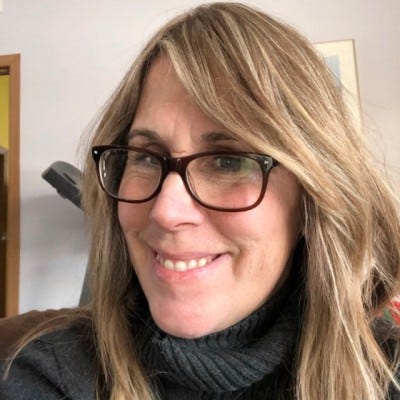Empowering Women in Engineering and Advancing Progress
The current role of women in engineering, processing, and manufacturing varies.
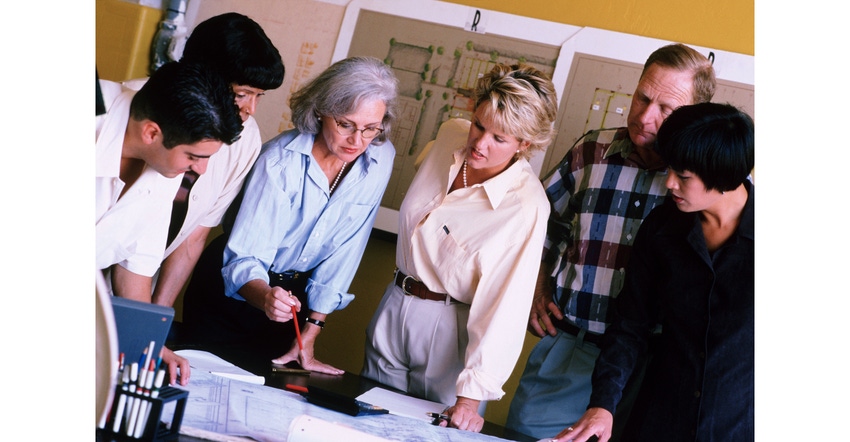
No matter if it is manufacturing, engineering, processing or other STEM industries, the overall picture of women in these fields is still relatively low — but definitely growing.
Long ago are the days where men were in the most senior-level roles and women were in lesser positions with the absence of a ladder leading to the top.
A blog by the Commerce Department’s National Institute for Standards and Technology (NIST) shared that attitudes both in the industry and among women are changing. Manufacturers have come to see that gender diversity boosts the bottom line, fosters a more dynamic and creative environment, and improves employee morale and retention.
This has led to an effort to draw women into the sector, beginning early on in their education, by making it clear that anyone can succeed in these careers.
What the Numbers Show
According to a 2022 report from the U.S. Bureau of Labor Statistics, women represented slightly more than 42% of the food manufacturing workforce. Additional reports indicate women make up 20% of senior leadership positions at food and beverage companies nationwide.
Although men still hold the majority (67.9%) of overall US manufacturing jobs, the Census Bureau’s Job-to-Job (J2J) Flows Explorer shows that from 2010 until 2020, the share of women in manufacturing jobs rose in every working-age category until 2020, when the COVID-19 pandemic hit.
In 2021, the data show the numbers going back up to pre-Covid levels. Certain age groups show an even higher spike than before the pandemic. For example, 8.6% of the people who went into manufacturing jobs were women ages 55 to 64 before the pandemic but increased to 9.1% in 2021.
In fact, employment for women in the industry reached its height this year, with a total of 3.77 million workers, according to National Association of Manufacturers (NAM) calculations based on Bureau of Labor Statistics numbers.
In the engineering fields, the percentage of female engineers and computer professionals varies by specialization. Only 9% of mechanical engineers are female compared to 35% of environmental engineers. In the computer industry, only 18% of software developers and 32% of computer and information research scientists are women.
The Census Bureau’s Science and Engineering Indicators show that women make up about 34% of STEM workers, representing 44% of those with a bachelor’s degree or higher and 26% of those without a bachelor’s degree.
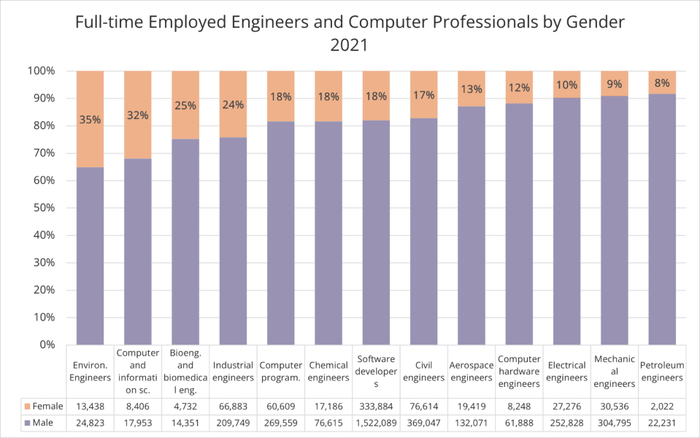
Among the ways the industry has been attracting more women and reducing the gender gap is by encouraging girls at a young age to study STEM subjects and changing the perception of women in manufacturing. For example, some universities offer college credits to girls in middle school and high school in manufacturing programs.
Since 2015, the annual Women in the Workplace report, produced by women-empowerment foundation LeanIn.org and global consulting firm McKinsey & Company, gives companies and employees information and resources needed to advance women and improve gender diversity within their organizations.
According to the 2022 report, although women are broadly underrepresented in corporate America, talent varies by industry. Some industries struggle to attract entry-level women (e.g., Technology: Hardware, IT and Telecom; Engineering; and Industrial Manufacturing), while others fail to advance women into middle management (Energy, Utilities, and Basic Materials) or senior leadership (Oil and Gas).
Women in Processing Panel
At this year’s International Powder & Bulk Solids Conference and Expo (the Powder Show) April 25-27 in Rosemont, IL, we introduced the first Women in Processing panel. We were delighted to have four top professionals in our industry on the panel.
Panelists included:
Casey Bickhardt, President/CEO and Owner of GEMCO, which has been manufacturing premium powder industrial mixers and vacuum dryers for over a century.
Diane Cave, Eastern Regional Manager - Canada, at Element6 Solutions, a consultancy offering virtual plant design; dust management, control and mitigation; and product recovery system solutions.
Carrie Hartford, Technical Sales Manager/Senior Project Engineer at Jenike and Johanson, a world-leading company in powder and bulk solids handling, processing, and storage technology.
Nicole Wolter, President/CEO, HM Manufacturing, providing technology for power transmission components such as gears, timing belt pulleys, splines, shafts, chain sprockets, sheaves, and related parts.
One of the questions posed to Hartford was “Tell us about your experience being a young woman entering the [process engineering] industry.” Out of college at 21, she began her career at Chevron, an oil refinery. She said she was lucky because she had a couple of older brothers, so she was used to being around her male counterparts and having to stand up for herself.
Cave said she always looked young “which is good when you’re 40 but not so much in your 20s.” So it might have been tough to start young, but as Cave has been in her field of dust management for 20 years now, she is well-respected as an expert. Still, she says once in a while it will happen, and Bickhardt has had it happen as well, that a male counterpart (customer, supplier, etc.) will want to talk with a male.
Wolter runs her company, as the second generation. She sits on four boards, acknowledges that she is still learning and growing in her role, and has instilled a mentorship program. Bickhardt also has a mentorship program through her company.
Hartford hit the nail on the head when asked if it was hard to work with men, especially in her role running a team of sales and engineers. She said that it isn’t a male/female thing; that you need to match the other person’s personality. To know how to work with other personalities is of utmost importance.
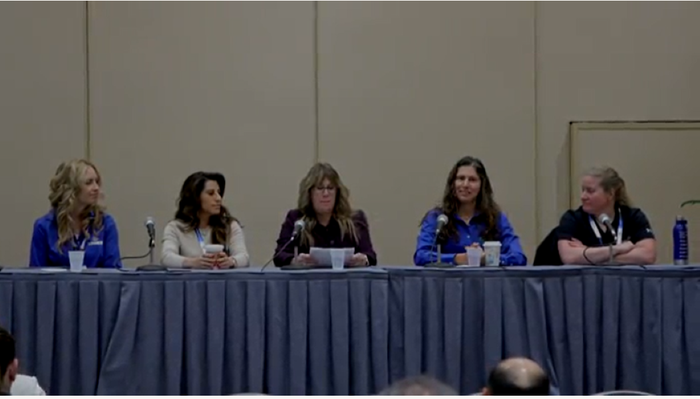
Panel members talked everything from working as a female CEO and how to deal with asking for a raise to how to get past gender bias and managing a team.
Audience members asked pointed questions during the hour-long event.
As well, a networking session post-panel allowed the audience to ask any private questions to any of the panel members.
The panel struck the audience — and panelists — and resonated with Powder & Bulk Solids that we now run a LinkedIn page for women in processing, have additional projects in the works, and will be back at Powder Show 2025 with another panel.
Resources
Here are just a few organizations that include memberships for women in the food industry, chemical and engineering that aim to assist women in these careers with educational webinars, events, learning groups, and other resources.
LeanIn.org helps women to achieve their goals and helps companies create inclusive workplaces where women in the workforce are supported and empowered.
LeanIn.org offers LeanIn Circles, which aim to bring women together for mentorship, camaraderie and support. Women in Circles are offered resources to navigate gender bias, grow leadership skills, and lean into their strengths. They are a separate space to share struggles, give and get advice and celebrate each other’s wins.
The company also provides employee training programs.
A great resource for women in the food and beverage industry is Females in Food, a members-only community and talent marketplace for women looking for vetted resources, meaningful connection and advancement in the Food and Beverage Industry.
Individuals as well as business owners are members. Women from these companies, which is not a total, are members: ADM, Coca-Cola Co., ADM, Cargill, Ingredion, SunOpta, Mondelez, 3M, and Danone.
There is a free membership for a few benefits, but the Community Membership includes many additional – such as discounted coaching and mentorship and courses, and a large resource library with trainings, speakers, and toolkits.
Similarly, Women in Chemicals is an organization that works to empower women in the chemical industry. Its purpose is to facilitate professional and personal connection among our community to drive visibility, career trajectory, and female empowerment in our industry.
Women in Chemicals offers resources, virtual networking, podcasts, newsletters, webinars, a quarterly book club, and more. Membership spans the Americas, Europe, and Asia. You can join via email.
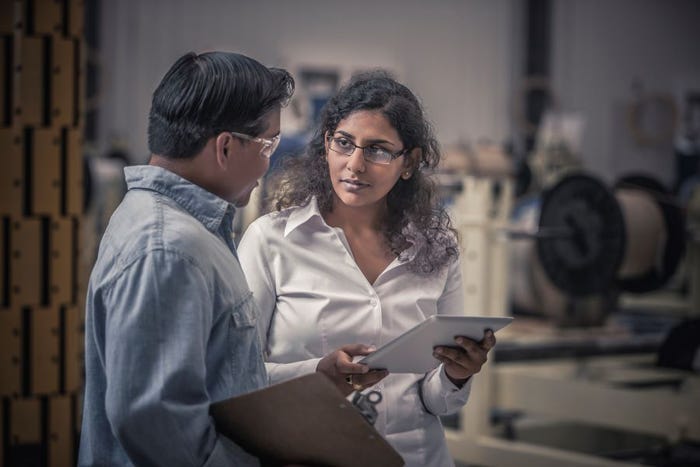
Society of Women Engineers has been around for more than seven decades and gives women in engineering a place and voice within the industry. It is centered around a passion for members’ success and continues to evolve with the challenges and opportunities reflected in today’s engineering and technology specialties.
The organization offers events, various memberships, programs, scholarships, and awards. The professional membership, for instance, is $100 per year.
The Women of Color Engineers works to advance the careers of women in engineering fields. The efforts of more than 20 companies help to make this happen. Some are: Raytheon Technologies, The Minerals, Metals & Materials Society (TMS), Society of Fire Protection Engineers (SFPE) Foundation, and more.
Membership is for professional societies and academic, industry, and government organizations that include engineers in their membership or workforce.
There are also various groups on LinkedIn, including our Women in Processing Group, and other organizations in various engineering, processing, and manufacturing sectors.
About the Author(s)
You May Also Like

